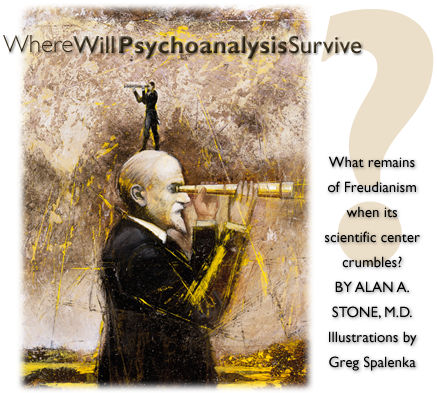Main Menu · Search ·Current Issue ·Contact ·Archives ·Centennial ·Letters to the Editor ·FAQs

A famous maxim found in Robert Burton's Anatomy of Melancholy states, "A dwarf standing on the shoulders of a giant may see farther than a giant himself." I think most of those who became psychoanalysts in my generation assumed that this maxim had to be true. Whether critical of Freud, as some people were, or reverential, as we were here in Boston, we all hoped to be able to see farther than the giant and to build on the foundation Freud had begun.
The most beautiful and moving description of the collective enterprise at that time was given by John Murray at the Boston Psychoanalytic Society. In presenting his interesting insights into narcissistic entitlement, he compared what we were doing to the construction of the great cathedral at Chartres, where workers toiled for more than a century, and declared that he would be satisfied with his career if he had placed one brick in the conceptual cathedral of psychoanalysis. Although Murray was more impassioned than most of my teachers in psychoanalysis, I think at some level they shared his conviction and tried to pass it on to us.
Unfortunately, I and many others in my generation have lost that sense of conviction and with it, the feeling that we are part of a collective enterprise. To us, the maxim about dwarfs standing on giants seems untrue or, at least, inapplicable to psychoanalysis. Those who stand on Freud's shoulders have not seen farther, they have only seen differently-and often they have seen less. Rather than building a cathedral, psychoanalysts have built their own churches. Consider from this perspective the two great women, Anna Freud and Melanie Klein, who dominated psychoanalysis after Freud's death. Each of them thought she was standing on Freud's shoulders and extending his true vision. And their adherents certainly believed they were building Freud's cathedral and accommodated both their psychoanalytic practice and thinking accordingly. Today, at least in my opinion-and I am not entirely alone in thinking this-neither Anna Freud's ego psychology nor Melanie Klein's object relations theory seems like a systematic advance on Freud's ideas. Rather they seem like divergent schools of thought, no closer to Freud's work than are the theories of Karen Horney, who rebelled against Freudian orthodoxy.
Whatever they may have thought they were doing, these distinguished leaders of psychoanalysis, and those who followed after them, have not been able to stand on Freud's shoulders and achieve the production of cumulative knowledge. In subsequent years the proliferation of divergent schools undermined the basic theoretical language of psychoanalysis. The distinguished psychoanalyst Heinz Kohut explained that it had become impossible to base his work on his predecessors' because he would have been entangled "in a thicket of similar overlapping, or identical, terms and concepts which, however, did not carry the same meaning and were not employed as a part of the same conceptual context."
The collapse of conceptual solidarity is now felt at the very center of psychoanalysis-among the self-declared Freudians. This is the diagnosis of Leo Rangell and Merton Gill, two leading figures of the American Freudian center. Gill, one of my first teachers and a wonderfully candid man, described the situation as follows: "Psychoanalysis seems to be in particular disarray...while there have always been dissenting voices and even new schools...the organized center seems to be less a majority viewpoint...." He worried that this was a "portent of the dissolution of the conceptual framework."
Additional information:
The original address from which this piece derives
A one-webpage version of this article, suitable for printing out for personal use
For information regarding copyright restrictions, please contact Jim Nourse, Dr. Stone's assistant, at Jnourse@law.harvard.edu
See the letters to the editor for comments on this piece, or to enter your own thoughts.